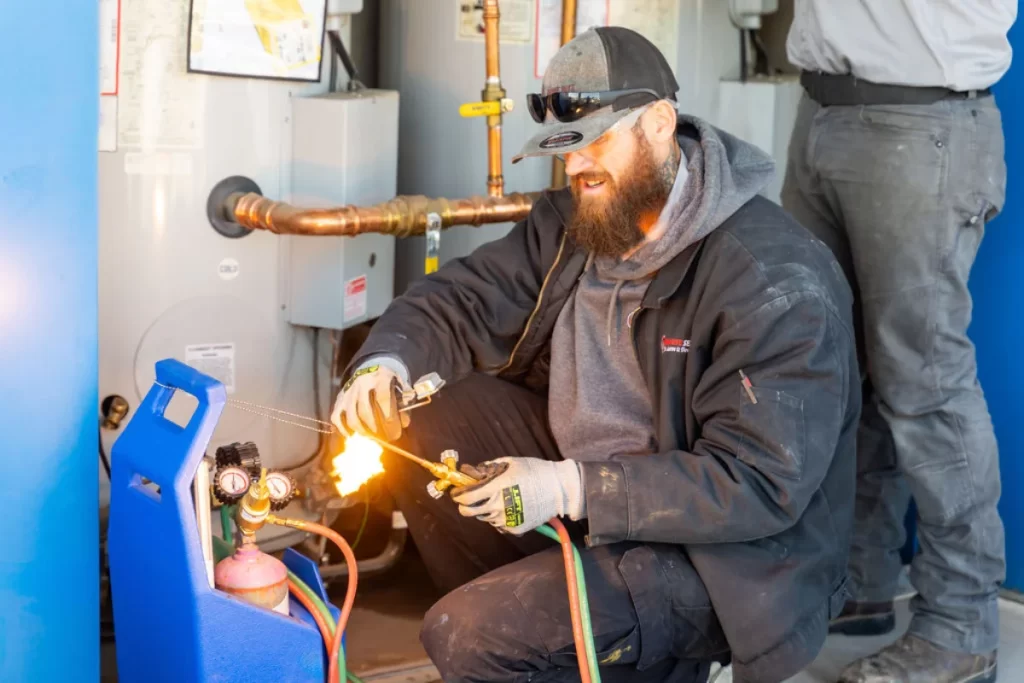
If you notice your water heater leaking in your home, you need to act quickly to prevent damage.
Here are the steps you should take:
- Turn off the power supply to the water heater. If you have a gas water heater, turn off the gas supply as well.
- Shut off the water supply to the water heater.
- Check and tighten any fittings that are leaking.
- Drain the tank by attaching a hose to the drain valve and directing it to a drain or outside.
- Once you drain the tank, inspect it for any visible cracks or damage.
- If you cannot locate the source of the leak or there is a major crack, it is best to contact a plumber.
For leaking water heaters in the Tucson area, call 520-369-3966 immediately for expert water heater repair assistance.
A leaking water heater can be a major inconvenience and cause significant damage to your home. Not only can it lead to costly repairs, but it can also result in mold growth and water damage.
Sometimes, you can repair your water heater, but in other instances, you will need a full water heater installation.
In this article, we will talk about what to do if your water heater is leaking, including when to call an emergency plumber, and explain some common reasons for water heater leaks.
As professional Tucson plumbers, we’ve seen our fair share of leaking water heater emergency situations.
Since Tucson has rather hard water, which can reduce how long your water heater lasts or affect the fittings, this can make water heaters in Tucson more vulnerable to leaks.
Whether the hot water heater is leaking from bottom, leaking from top, or leaking from the relief valve, we explore these situations.
We will also cover some prevention tips to ensure your water heater stays in top condition and prevent your water heater leaking from becoming an issue in the first place.
If you are in the Tucson area and experiencing a water heater leak or need a professional 24 hour plumbing service to take a look at your water heater, contact our office at Done Rite Services today.
Table of Contents
Immediate Steps to Take for a Leaking Water Heater
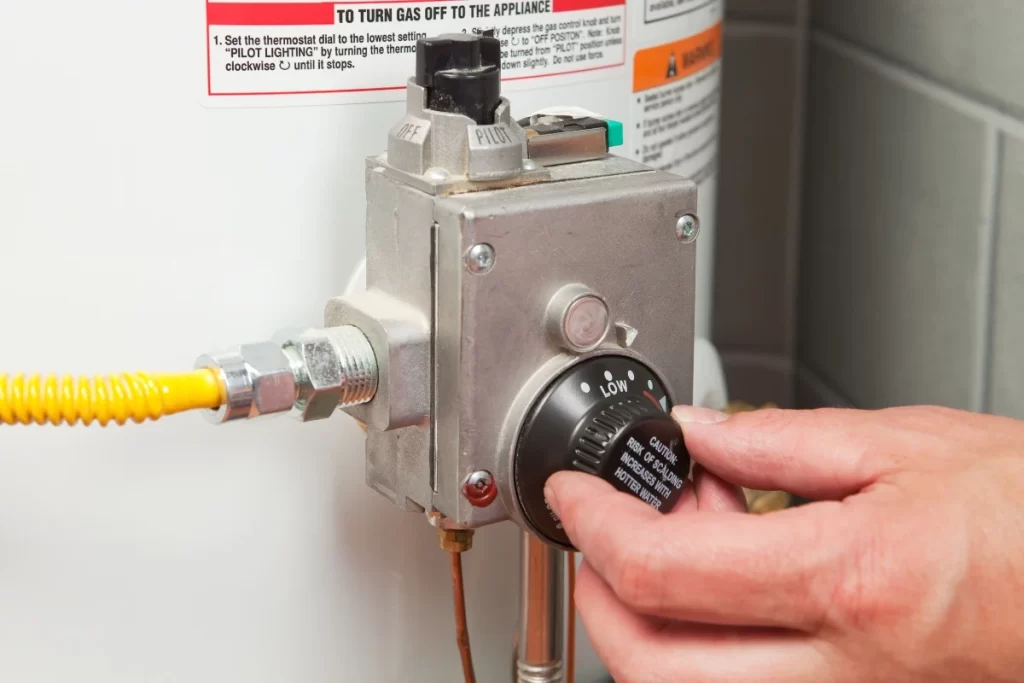
If you notice your hot water heater leaking, it is crucial to know how to fix a leaking water heater or seek affordable leaky faucet repair services to prevent further damage to your home. Here are the steps you should take:
Step 1: Turn off the power and gas to the water heater.
To ensure your safety when handling your water heater leaking, it is essential to cut off the power supply to the leaking water heater. If you have an electric water heater, locate the circuit breaker that controls the heater and switch it off. For gas water heaters, find the gas supply valve and turn it off. This step will help prevent any potential hazards while you address the leak.
Step 2: Shut off the water supply to the leaking water heater.
The next step is to stop the water flow into the water heater. Locate the water supply valve that connects the water heater to the main water line and turn it off. This action will prevent additional water from entering the tank, minimizing the leak’s severity.
Step 3: Drain the tank by attaching a hose to the drain valve and directing it to a drain or outside.
To alleviate the pressure and reduce the amount of water in the bottom of the tank, you need to drain it. Attach a hose to the drain valve at the water heater’s bottom and direct the other end to a drain or outside area. Open the drain valve to start draining the water. Be cautious as the water may be hot, so use appropriate safety measures.
Step 4: Once you drain the tank, inspect it for any visible cracks or damage.
After draining the tank, carefully examine it for any visible cracks, corrosion, or damage. You should look for signs of leakage, such as water stains or wet spots. If you notice any significant damage, it is advisable to consult a professional plumber to assess the situation and provide appropriate repairs.
Step 5: Apply a temporary fix
Depending on the source of the leak, you can apply different temporary fixes.
For Leaks from Valves or Fittings:
- Tighten any loose fittings with a wrench. Be careful not to over-tighten, as this can exacerbate the problem. If the leak is from the T&P valve, check if it is due to excessive pressure or temperature and address those issues.
For Leaks from the Tank:
- If the leak is small and from the hot water tank, you can use epoxy putty or a similar sealant as a temporary fix. Ensure the area is dry before applying the putty, and give it ample time to set.
For Drain Valve Leaks:
- If the leak originates from the drain valve, ensure it is completely closed. If it continues to leak, attaching a garden hose and directing the water to a safe location can serve as a temporary workaround.
Step 6: If you are unable to locate the source of the leak or easily repair it, it is best to call a professional plumber for assistance.
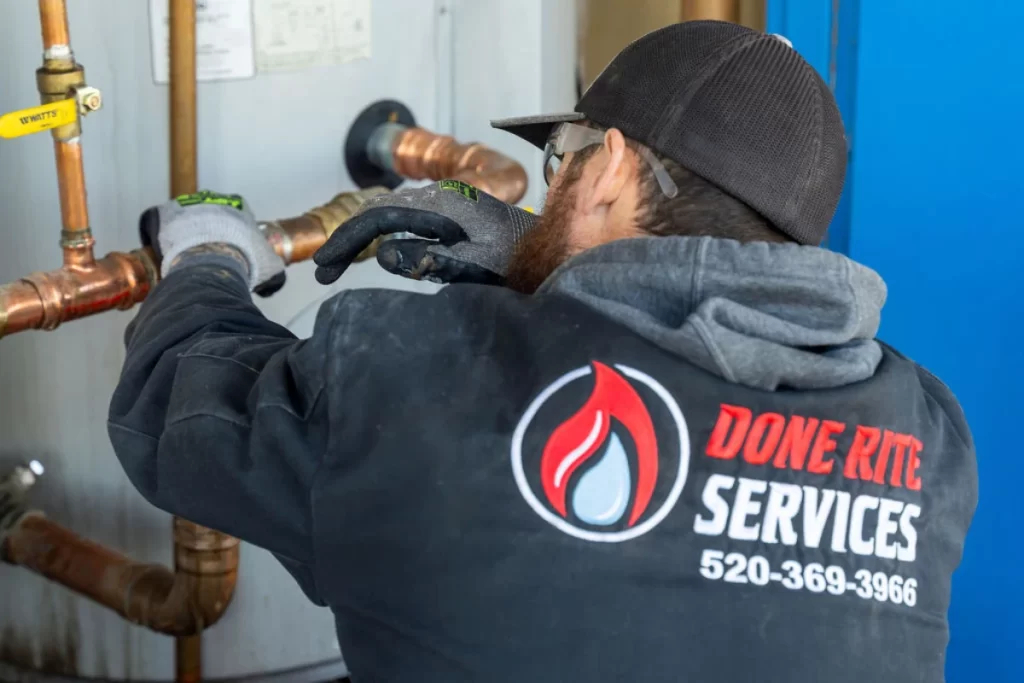
Sometimes, identifying the exact source of the leak can be challenging. If you cannot determine where the leak is coming from or if the leak persists despite your efforts, we recommend you seek the help of reliable plumbing services. They have the expertise and tools to diagnose and fix the issue effectively, ensuring the proper functioning of your water heater.
Remember, a leaking water heater can lead to costly repairs, mold growth, and water damage. By following these steps, you can mitigate the damage and ensure the safety of your home.
Step 7: Ask yourself if a leaking water heater is an emergency?”
Minor leaks do not necessarily require emergencies; major leaks, however, do.
If a leak is major, serious issues such as home damage or electrical issues may come up. This is unsafe for everyone, especially the most vulnerable in our population. Therefore, in this case, it would be an emergency.
Why Do Water Heaters Leak?
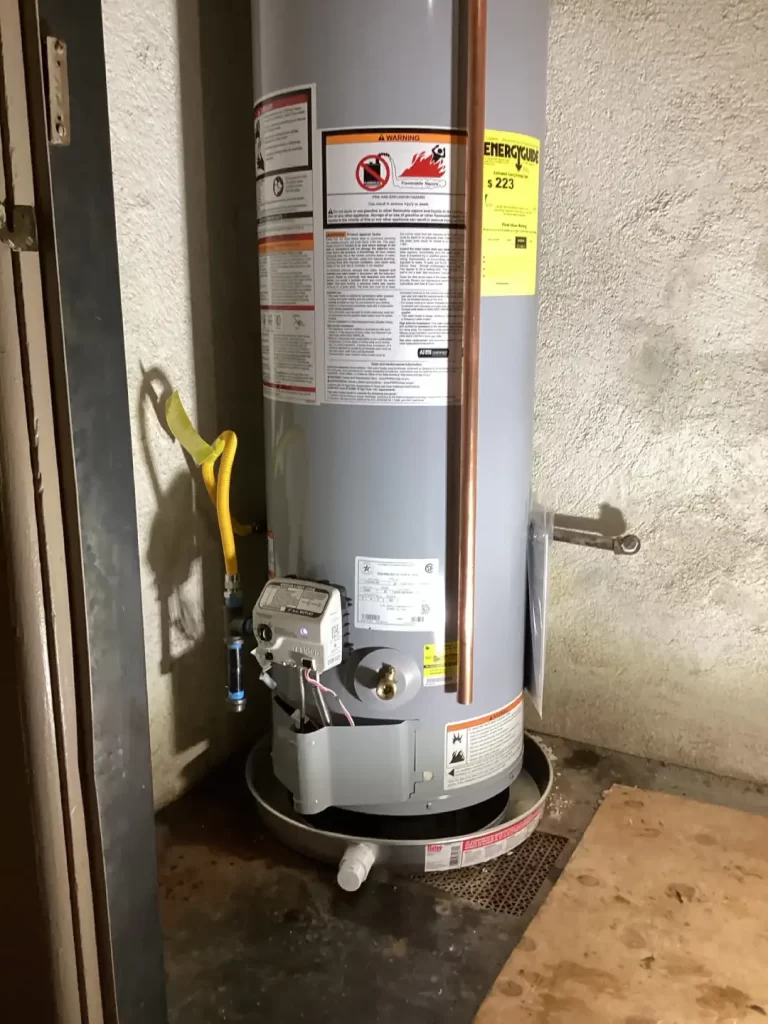
Water heaters can last for many years, but they are not immune to wear and tear. Over time, the constant heating and cooling of water can cause the tank to deteriorate, leading to tank leaks.
Additionally, sediment buildup, high water pressure, and faulty installation can also contribute to water heater leaks. We will take a closer look at these common causes.
Sediment Buildup
One of the most common causes of water heater leaks is sediment buildup.
As time passes, minerals and dirt can build up in the tank, which can lead to rust and make the tank weaker.
This can lead to cracks and leaks in the tank.
To prevent sediment buildup, it is important to regularly flush your water heater. This involves draining the tank and removing any sediment that has accumulated. We recommend you do this at least once a year to keep your water heater functioning properly.
High Water Pressure
High water pressure can also cause water heater leaks. When the pressure inside the tank is too high, it can put strain on the tank’s walls, causing them to weaken and eventually leak.
To prevent this, it is important to regularly check your water pressure and make sure it is within the recommended range. If your water pressure is consistently high, you may need to install a pressure reducing valve to regulate it.
Faulty Installation
Improper installation can also lead to water heater leaks. One common source is if you do not install the tank correctly, it can put unnecessary strain on the tank’s walls, causing them to weaken and eventually leak.
To avoid this, it is important to have your water heater installed by a professional. They will properly support the tank and secure all connections
What are Causes of Water Heaters Leaking From Top, Bottom or Side?
The leak location is also a helpful, concrete way for you to see what the issue may be right away.
Water Heater Leaking From Top
If you notice the leak is at the top of your water heater, it is likely a problem with your pipes. You can correct loose pipe connections by using a pipe wrench to secure both the hot and cold water inlet pipes
Water Heater Leaking From Relief Valve/Side
If the leak is more to the side, it may be an issue with your temperature pressure relief valve. To address this, make sure the valve temperature is not above 120°F. If it is still leaking from the side even under a suitable temperature, you may need to replace your valve.
Water Heater Leaking From Bottom
You can handle bottom issues by looking for signs of corrosion in the drain valve. If there is corrosion or tightening the valve does not work despite there being no corrosion, you may need to replace the valve.
Signs of a Water Heater Leak
It is important to be aware of the signs of a water heater leak so that you can address the issue before it causes significant damage. Here are some common signs to look out for:
- Puddles of water around the base of the water heater
- Damp or discolored walls or floors near the water heater
- Rust or corrosion on the tank or pipes
- Strange noises coming from the water heater
- A decrease in hot water supply
If you notice any of these signs, it is important to address the issue as soon as possible to prevent further damage.
How to Prevent Water Heater Leaks
While some causes of water heater leaks are unavoidable, there are steps you can take to prevent them from occurring. Here are some tips to help you avoid a water heater leak in your home:
Regular Maintenance
Regular maintenance is key to preventing water heater leaks. As mentioned earlier, it is important to flush your water heater at least once a year to remove any sediment buildup. Additionally, we recommend you have a professional inspect your water heater every 2-3 years to check for any potential issues.
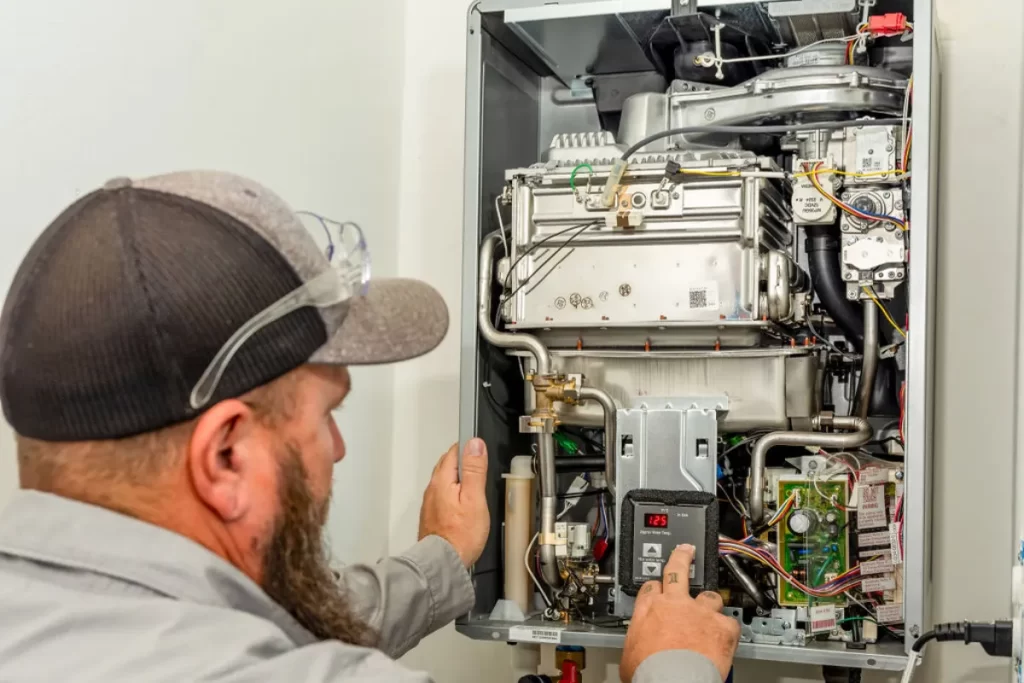
Monitor Water Pressure
As mentioned earlier, high water pressure can cause water heater leaks. It is important to regularly check your water pressure and make sure it is within the recommended range. If you notice consistently high water pressure, it may be necessary to install a pressure reducing valve.
Address Any Issues Promptly
If you notice any signs of a water heater leaking water, it is important to address the issue as soon as possible. Ignoring the problem can lead to further damage and potentially costly repairs.
If you are unsure of how to address the issue, it is best to consult a professional plumber who can properly diagnose and fix the problem.
Conclusion
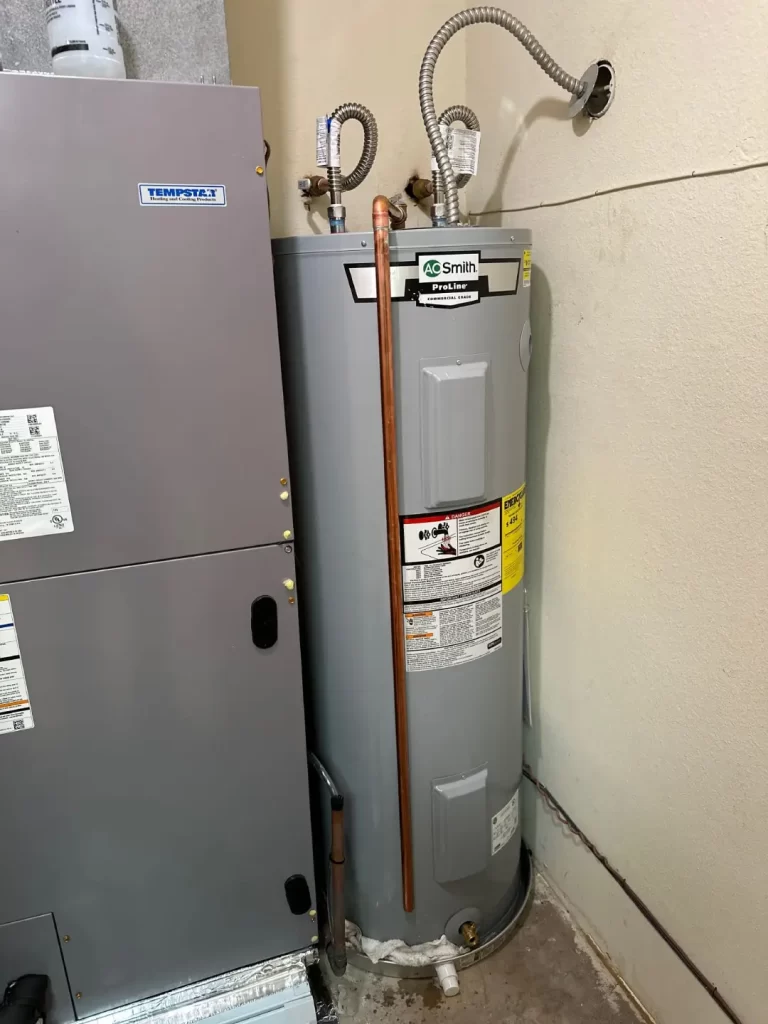
A leaking water heater can be a major inconvenience and cause significant damage to your Tucson home. By understanding the common causes of water heater leaks and taking preventative measures, you can avoid this issue and ensure your water heater functions properly for years to come.
Remember to regularly maintain your water heater, monitor water pressure, and address any issues promptly to prevent leaks. If you do experience a leak, be sure to take immediate action and consult a reliable plumbing service for assistance.
By following these tips, you can keep your water heater in top condition and avoid the hassle and expense of a water heater leak.
We hope this information answers your question as to whether a leaking water heater is dangerous. If issues arise or if you want additional advice, please contact our office promptly.
For more tips and guides on plumbing issues, check out our blog on handling a pipe burst emergency.
If you reside in Saddlebrooke and need assistance, our plumbing experts in Saddlebrooke are ready to help.
